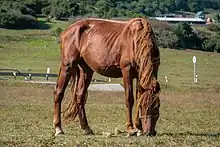gora
See also: Appendix:Variations of "gora"
English
Alternative forms
Etymology
From Hindustani گورا (gorā) / गोरा (gorā).
Noun
gora (plural goras, feminine gori)
- (North India, Pakistan, British India, elsewhere slang, ethnic slur) A white person.
Derived terms
References
- “gora”, in Collins English Dictionary.
- “gora”, in Lexico, Dictionary.com; Oxford University Press, 2019–2022.
- gora in A Dictionary of English Slang & Colloquialisms; Ted Duckworth.
- Henry Yule, A[rthur] C[oke] Burnell (1903) “gora”, in William Crooke, editor, Hobson-Jobson […] , London: John Murray, […].
Basque
Etymology
From an earlier form goira (still in use in Biscayan), from goi (“up, high”) + -ra (allative suffix).[1]
Pronunciation
Audio (file) - IPA(key): /ɡoɾa/, [ɡo̞.ɾa]
References
- “goi” in Etymological Dictionary of Basque by R. L. Trask, sussex.ac.uk
Galician
Verb
gora
- inflection of gorar:
- third-person singular present indicative
- second-person singular imperative
Italian
Pronunciation
- IPA(key): /ˈɡɔ.ra/
- Rhymes: -ɔra
- Hyphenation: gò‧ra
Lower Sorbian
Northern Sami
Pronunciation
- (Kautokeino) IPA(key): /ˈkora/
Verb
gora
- inflection of gorrat:
- present indicative connegative
- second-person singular imperative
- imperative connegative
Nyishi
Etymology
Borrowed from Indo-Aryan. Compare Hindi घोड़ा (ghoṛā).
Portuguese
Verb
gora
- inflection of gorar:
- third-person singular present indicative
- second-person singular imperative
Serbo-Croatian
Etymology
Inherited from Proto-Slavic *gora, from Proto-Balto-Slavic *garā́ˀ, from Proto-Indo-European *gʷerH-. Cognate with Slovene gora.
Pronunciation
- IPA(key): /ɡǒra/
- Hyphenation: go‧ra
Noun
gòra f (Cyrillic spelling го̀ра)
Declension
Further reading
- “gora” in Hrvatski jezični portal
Slovene
Etymology
From Proto-Slavic *gora, from Proto-Indo-European *gʷerH-.
Pronunciation
- IPA(key): /ɡɔ̀ːra/
- Hyphenation: go‧ra
Noun
góra f
Inflection
| Feminine, a-stem | |||
|---|---|---|---|
| nom. sing. | gôra | ||
| gen. sing. | gôre | ||
| singular | dual | plural | |
| nominative (imenovȃlnik) |
gôra | gôri | gôre |
| genitive (rodȋlnik) |
gôre | gôr | gôr |
| dative (dajȃlnik) |
gôri | gôrama | gôram |
| accusative (tožȋlnik) |
gôro | gôri | gôre |
| locative (mẹ̑stnik) |
gôri | gôrah | gôrah |
| instrumental (orọ̑dnik) |
gôro | gôrama | gôrami |
| Feminine, a-stem, long mixed accent | |||
|---|---|---|---|
| nom. sing. | gôra | ||
| gen. sing. | goré | ||
| singular | dual | plural | |
| nominative (imenovȃlnik) |
gôra | goré | goré |
| genitive (rodȋlnik) |
goré | gorá | gorá |
| dative (dajȃlnik) |
gôri | goráma | goràm |
| accusative (tožȋlnik) |
goró | goré | goré |
| locative (mẹ̑stnik) |
gôri | goràh | goràh |
| instrumental (orọ̑dnik) |
goró | goráma | gorámi |
Tagalog
Alternative forms
Pronunciation
- IPA(key): /ˈɡoɾa/, [ˈɡo.ɾɐ]
- Hyphenation: go‧ra
Noun
gora (Baybayin spelling ᜄᜓᜇ)
Verb
gora (Baybayin spelling ᜄᜓᜇ)
Derived terms
- gorabels
- gorahan
- gumora
Further reading
- “gora”, in Pambansang Diksiyonaryo | Diksiyonaryo.ph, Manila, 2018
This article is issued from Wiktionary. The text is licensed under Creative Commons - Attribution - Sharealike. Additional terms may apply for the media files.
